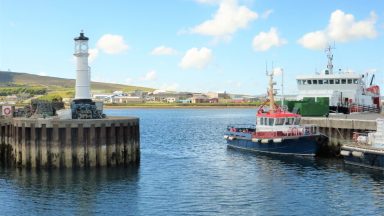The Scottish Government has overturned planning permission for a new home in Skye.
Caroline Clouston had applied to build a new home next to her existing house in Kyleakin, but the Scottish Environment Protection Agency (Sepa) raised concerns that the site could be prone to flooding every 200 years.
The Scottish Government agreed, setting out its concerns in a letter to the council on July 22.
Locals fear the decision sets a dangerous precedent that could stifle growth in Highland coastal communities.
Additionally, the new north planning chairman says he’ll push for a meeting between the council and the Scottish Government to discuss a “more sensible solution”.
An accessible home next door
Caroline Clouston lives in Seabank, a one-and-three-quarter-storey home near the Kyleakin seafront. Ms Clouston hoped to build a new, accessible property next door, on the site of the former village post office.
She says the new build would have been more environmentally friendly and economical. It would also be more suitable for Ms Clouston as she grows older and make it easier for her daughter, a wheelchair user, to visit.
The original planning application created a stir at the north planning committee last August.
Sepa recorded a formal objection, stating that the property is at risk of one in 200-year and one in 1000-year coastal flooding events. They calculated the annual flooding probability at 0.5%.
The agency also highlighted that there’s currently no flood defences in place and no plans to add any. And because the site is surrounded by low-lying land, residents could become trapped.
As a result of Sepa’s concerns, council planners recommended the application for refusal. However, the north planning committee launched a fierce defence.
They said the area had never flooded in living memory and accused Sepa of taking a “doomsday approach” to forecasting in coastal areas.
Councillors voted to grant planning permission, but because Sepa is a national government agency, the decision was referred to ministers.
No escape route
Ultimately, both the Scottish Government reporter and ministers found in favour of Sepa.
Their letter states: “Scottish ministers agree with the reporter’s findings that the proposed dwelling, including its front and side garden, would be surrounded by water in the event of a one in 200 year flood event. Access roads would likely also be surrounded by water in a flood event, safe access and egress cannot be assured.”
The letter goes on to consider the Equalities Act 2010 and accepts that the new house could better meet Ms Coulston’s needs.
“However, the reporter considers that this is not a compelling enough reason to set aside established national planning policy.”
The decision puts particular weight on the dangers posed by a flood, with the reporter stating that it would be unsafe – or maybe impossible – to get to dry land from the new home.
Ms Coulston believes the decision is inconsistent.
“They said there’s no escape route in a flood, but what about the other 20 residents along the pier?” she says.
Ms Clouston says that the owners of a nearby property got planning permission to convert their garage into self-catering units, while two new homes got the green light near the river in Broadford.
“It’s very inconsistent,” she says. “This site has never flooded but others in the area which were granted planning permission have.
“It does feel quite unfair, especially to have taken so long,” says Ms Clouston. “It’s been the best part of two years since we started this process and there was no problem at the pre-application stage. It’s very disappointing.”
Future risks must be considered
Surprisingly, the report states that Sepa would not have objected to an extension on the existing Kyleakin home. This is because a new build implies an increase in the population in an area classed as vulnerable to risk, whereas an extension does not.
The old post office further complicates things, again because the change of use to residential effectively puts more people in the flood risk zone.
Ms Coulston and her family have lived in Kyleakin all her life, as have generations of her family. To her knowledge the area has never flooded before, and she’s simply looking to move next door.
However, planning officials last August warned councillors that they must consider the future.
“Fifteen years ago this wouldn’t have been an issue, but with improved climate change data we will be faced with difficult questions and challenges more frequently,” said planning manager Dafydd Jones.
“Just because this property has never flooded before, doesn’t mean that it won’t. It’s important we have regard for that.”
‘Astounding and ridiculous’
Indeed, this is far from the end of the story. Local members say the decision in Kyleakin sets a dangerous president.
Ms Clouston’s partner is local councillor John Finlayson. He wants the Scottish Government to undertake an impact assessment for coastal communities.
“Their one-size-fits-all approach does not support the west coast,” he says.
“The fact that the Scottish Government has once again undermined local democracy – and a decision taken by the north planning committee – also causes me concern.”
Councillor Drew Millar took over as chairman of the north planning committee after the election. He called the reporter’s judgement on the Kyleakin home “astounding and ridiculous”.
“This instance highlights the anomalies within the system,” he says.
“Discussions need to take place between the council and the Scottish Government to try to come to a more sensible solution.”
Mr Millar is getting the ball rolling now, and hopes to bring a proposal to members at committee next Wednesday.
The wider debate is just beginning, but for Ms Clouston, it’s an unhappy end to a frustrating process.
“The lack of consistency and ambiguity is worrying and needs evaluated both locally and also nationally,” she says.
“Our local planners need to be more supportive of residents living in coastal communities.”
Follow STV News on WhatsApp
Scan the QR code on your mobile device for all the latest news from around the country


 iStock
iStock



















